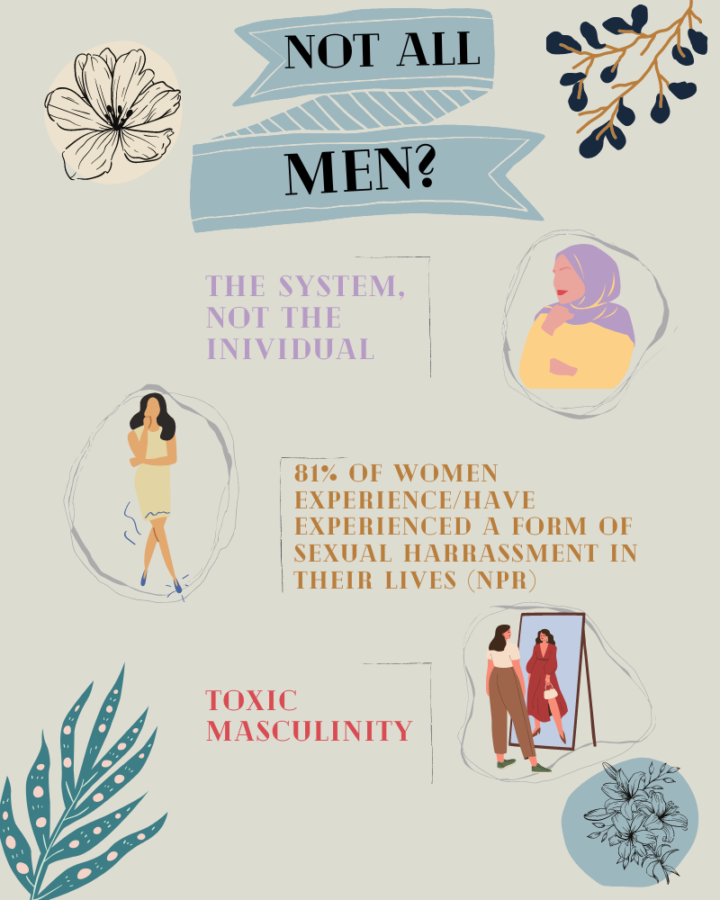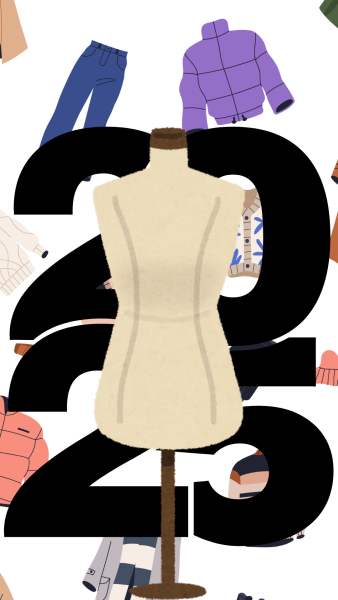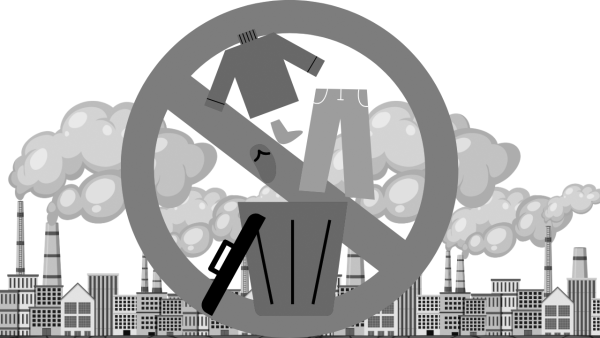Why the argument ‘not all men’ is invalid
Someone next to you is talking about how a man catcalled them in the middle of the sidewalk. They go on to say that lately, they’ve been getting so annoyed with men. Imagine what happened next.
Anyone who says something about men in general is going to get at least one man piping up, usually with the phrase “But it’s not all men!” in a tone that suggests what they are truly saying: “Your argument is invalid.”
This is becoming increasingly common, especially online. Many videos about men making women or feminine-presenting people uncomfortable have the comments flooded with men defending their gender.
Now, of course it’s not all men. But the emphasis in that sentence is completely wrong. The cause of the problem isn’t ALL men, there are others. However, saying that not all men are the problem doesn’t actually do anything to contradict a complaint about men in general; it’s addressing points that aren’t being made. When women say anything about men in general, we aren’t saying every man out there is a horrible person.
We are saying that as a group, men can be downright creepy and rude. “No one is saying all men, no one is accusing you personally right now. It feels like it’s an excuse not to do anything or to take any action” said junior Susannah Schwantes.
Let me break it down. If someone says that they hate politicians, and someone else in the room pops up with “But not all politicians are bad! Some are good,” they missed the point completely. The system of politicians is bad. The overall concept of politicians and their pandering to certain groups is a bad system, and that person hates that system.
It is the same thing with men. It’s not being said that all men are horrible individually, but the system of what men do and how it’s addressed is bad. “It feels like it’s invalidating my experience and everyone else’s experience just because you don’t want to be grouped into this horrible group of people that you are a part of. You might not be a part of the problem, but unless you are doing something to stop it you are a part of it,” Schwantes said.
Women don’t hate men. It’s the system that has been set up by them, and therefore the general group of men, that they hate. It is a fact that women get paid less than men in high paying positions. It is a fact that men do a majority of sexual harassment in the world. It is a fact that women had to fight tooth and nail for the ability to vote in a democracy.
It’s a fact that women are afraid to report those sexual harassments in fear of being demeaned and told she was ‘asking for it.’ Schwantes said, “It’s hard to speak out against these things without being a ‘crazy feminist girl.’ That’s something I’ve struggled with a lot. If I talk too much people will stop listening, but I still have to get this point across.”
Yes, men do get sexually harassed. Yes, men do have issues with toxic masculinity. There is no denying that. But using it as an argument as to why women’s concerns are invalid is not a good argument to make, nor does it help your cause. Just because people are upset at an issue that isn’t yours, doesn’t mean you have to discredit that issue.
Sophomore Lara Schott spoke on this issue: “I think men a lot of the time deflect the problem by bringing up another problem that affects them personally, which they don’t realize was caused, not by them directly, but by a patriarchal society. Sexual harassment with men, men not getting attention from that […] they don’t realize that is another thing that was set up by the patriarchial society.”
And it raises the question: How fragile are you in your so-called ‘masculinity’ if you have to discredit others for it? If you have to argue that ‘no, I don’t sexually harass people?’
On the topic of masculinity, this toxic mindset can be a driving force for women to be treated badly. Society pushes men to defend their masculinity, be dominant in relationships, and take what they want. While it isn’t an excuse, it can show the reason men feel compelled to harass those around them. With a mindset that teaches kids to be mean to those they like, it is easy to push that to a point beyond saving.
This matter isn’t helped by people like Andrew Tate (who was just recently arrested, yay!) who push the masculinity angle. Young boys may see his content and latch onto it, using him as a role model. Meanwhile, he is human trafficking and moving to a country that ‘has less strict rape charges.’ Defending a man who moved to a place with less strict sexual harassment charges is ridiculous
The backlash from speaking up against actions like those of Andrew Tate can make living as a woman much harder. “I try to speak up as much as I can but it’s difficult, because when you’re in that environment and someone is saying ‘not all men!’ or someone like Andrew Tate comes up, it’s difficult to defend yourself or defend women without looking like a crazy feminist.” said Schott.
Are we really teaching our kids that rape is ‘not that bad?’ Are we teaching them that girls need to cover up instead of teaching them that unwanted advances aren’t okay? What is our world if we don’t treat human beings like human beings? “It was mind boggling to me that people were so set on defending him instead of protecting me or giving me sympathy.” Schwantes said, “It’s really frustrating to feel so dehumanized.”
Having constant denial of the issues that are very much real can be incredibly frustrating. Not being able to express frustration about issues that are caused by the system set up by men without interruption or resistance feels horrible, especially when the frustration is personal. It’s one of the reasons that women’s sexual harassment goes unreported, because they grew up thinking it is right.
They grew up being told that boys tug on their pigtails and hit them because they like the girls. They grew up dealing with obvious gender roles and restrictions. “Especially when it happens to you young, it affects every single aspect of your life. Like with brain development you know, it’s in there so you literally have to go back and rewire all of these ways about thinking about yourself, about this person, you know, about all men or women.” Schwantes said.
This training causes them to think ‘Boys will be boys’ is a valid saying. This causes them to think that any catcalling or uncomfortable flirting is just ‘locker room talk.’ They also grow up with the world around them telling them that any sort of unwanted advances, or perusal, is their fault. Short dresses, crop tops, or women’s bodies are all reasons that people state for rape. This causes young girls to fear walking alone, discourages them from dressing how they want to dress. For many people, the assaulters are family members, or close friends of the family. At this point, women are seen more as cattle than as human.
Men are not bad people, nor do I hate them. But the fact of the matter is that a lot of men have done bad things to women, and the system they set up prevents the consequences they might face. “Not all men” shouldn’t be used to discredit women’s experience, and it needs to be understood that women are grouping men instead of individualizing them.
A survey done in the US showed that 97% of women asked had been sexually harassed in some way. This statistic was very popular on social media in 2022, and it was a main argument against those defending men. “I know it’s not all men, but that doesn’t help, that doesn’t make me any less scared, you know?” Schwantes added, “I’d say it’s enough. It’s enough men. Not all men but all women. Cause, you know, like the 97% was just based on one survey and people reported. So it’s like, how many people weren’t in the survey?”
Your donation will support the student journalists of Fargo North High School. Your contribution will allow us to resume physical printing of our newspaper for students at Fargo North!

I am an avid reader and writer, and love learning about what's going on in the world. I love experiencing the community in Fargo, and talking...





